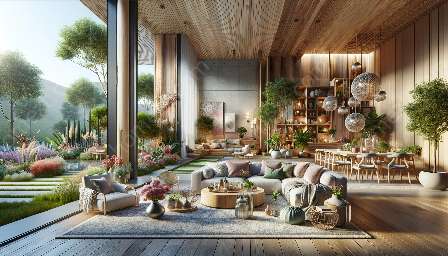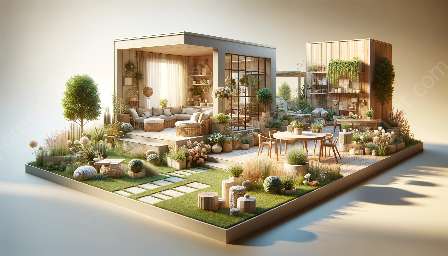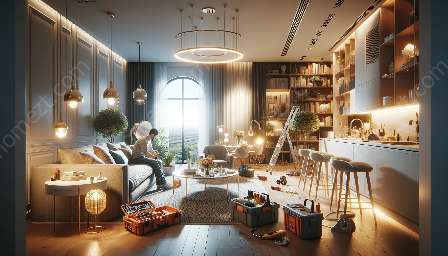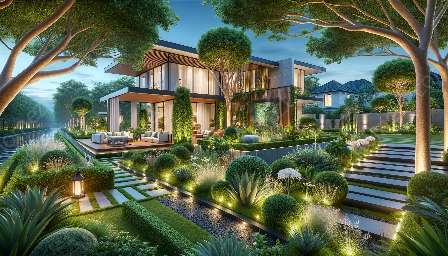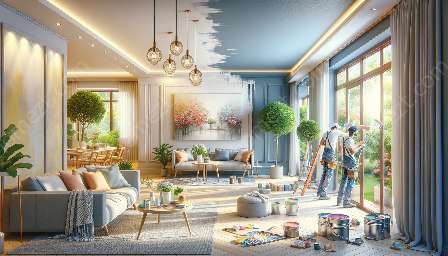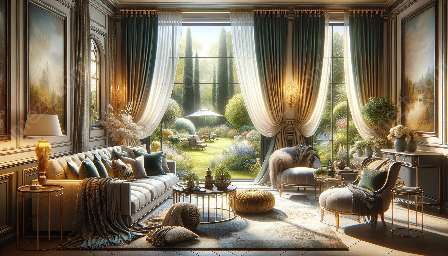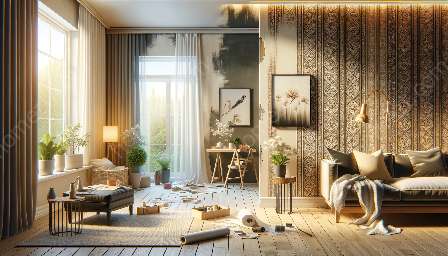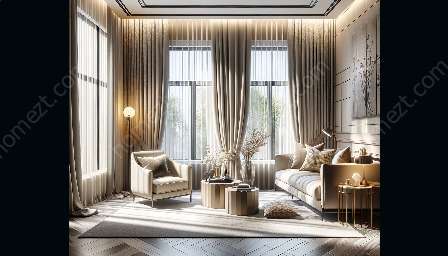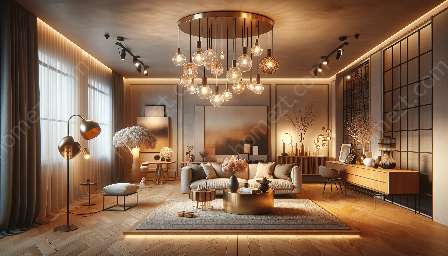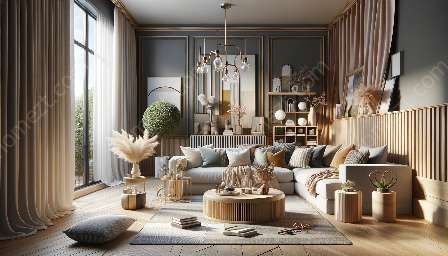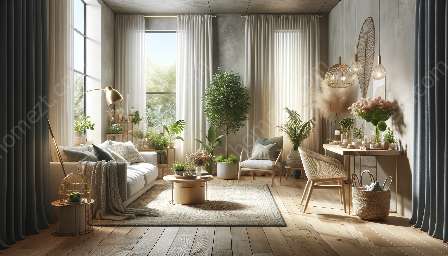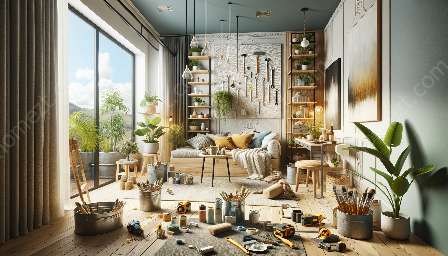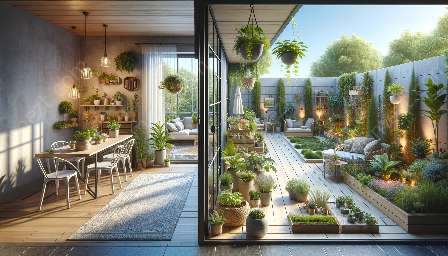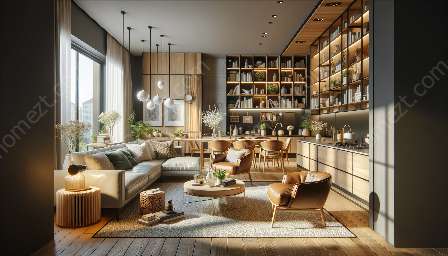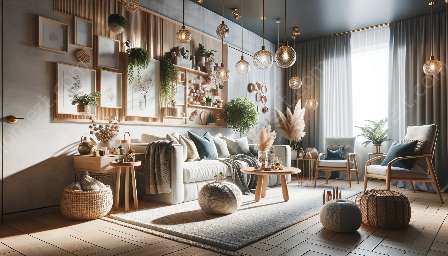Feng shui is an ancient Chinese practice that focuses on the flow of energy, or chi, to create harmonious and balanced environments. In the context of homemaking and interior decor, feng shui plays a significant role in creating spaces that not only look beautiful but also feel inviting and comfortable. In this article, we will delve into the principles of feng shui and explore how it can be integrated into your home and garden, adding a holistic dimension to your living space.
The Basics of Feng Shui
Feng shui is based on the idea that the arrangement and orientation of objects and spaces can affect the flow of energy within a given area. By following the principles of feng shui, it is believed that one can create an environment that supports well-being, prosperity, and positive relationships. The core principles of feng shui revolve around the balance of elements, harmony in color and texture, and the proper arrangement of furniture and decor.
Applying Feng Shui in Homemaking
Homemaking involves creating a nurturing, peaceful, and comfortable environment for yourself and your family. Incorporating feng shui principles into your homemaking endeavors can significantly impact the energy and atmosphere of your home. This can be achieved by paying attention to the layout of your home, the selection of colors and materials, and the overall organization of your living space. By aligning these elements with feng shui principles, you can create a space that feels harmonious and supports the well-being of everyone in the household.
Color and Texture
Color and texture play a crucial role in feng shui. Each color and texture is associated with specific elements and energies, and incorporating them mindfully can enhance the flow of chi in your home. For example, using earthy tones and natural textures such as wood and stone can bring a grounding and stabilizing energy to the space. On the other hand, incorporating metal elements through decor pieces or colors can add clarity and precision to the environment. By understanding the associations between colors, textures, and elements, you can create a balanced and harmonious visual palette for your home.
Furniture Arrangement
The arrangement of furniture in your home can either facilitate or block the flow of energy. In feng shui, it is essential to ensure that the furniture is placed in a way that allows for the free movement of chi throughout the space. This often involves avoiding cluttered or obstructed pathways and creating open, inviting areas. Additionally, the positioning of furniture in relation to doors and windows is crucial for promoting a smooth flow of energy.
Integrating Feng Shui into Interior Decor
Interior decor is a fundamental aspect of creating a visually pleasing and energetically balanced home. By following feng shui guidelines, you can curate an interior decor scheme that supports positive energy and enhances the overall ambiance of your living space.
Decor Elements
Decor elements such as mirrors, plants, and artwork can be strategically placed to harness positive energy and amplify the flow of chi. Mirrors, for instance, are often used to expand space and reflect natural light, creating a sense of openness and abundance. Meanwhile, incorporating live plants brings vitality and a refreshing energy into the home. When selecting artwork, consider the symbolism and emotional impact it carries, as well as its compatibility with the overall feng shui of the space.
Lighting and Air Quality
Lighting and air quality are integral components of interior decor and feng shui. Adequate lighting not only illuminates the space but also influences the energy flow within it. Natural light is highly valued in feng shui for its uplifting and purifying qualities. Maximizing natural light and ensuring good air circulation contribute to creating a vibrant and harmonious atmosphere in the home.
Enhancing the Energy Flow in the Garden
As an extension of your living space, the garden offers an opportunity to integrate feng shui principles into the outdoor environment, promoting a seamless flow of energy from the indoors to the outdoors.
Landscaping and Plant Selection
Applying feng shui to your garden involves carefully planning the layout and selection of plants to optimize the flow of energy. The arrangement of pathways, water features, and greenery should aim to create a sense of balance and tranquility. Choosing plants based on their feng shui qualities, such as their shapes, colors, and growth habits, can enhance the overall energy of the garden.
Outdoor Living Spaces
Creating inviting and functional outdoor living spaces aligns with the principles of feng shui. By designing areas for relaxation, socialization, and contemplation, you can foster a harmonious flow of energy in your garden. Incorporating elements such as comfortable seating, water features, and natural materials contributes to the overall balance and vitality of the outdoor environment.
The Benefits of a Balanced Home
By integrating feng shui principles into your homemaking, interior decor, and garden design, you can experience a range of benefits. A balanced and harmonious home can promote a sense of well-being, encourage positive relationships, and cultivate a supportive environment for personal growth and fulfillment.
Well-being and Balance
A home that is in harmony with feng shui principles can have a positive impact on the well-being of its residents. Creating a supportive and nourishing space promotes physical, emotional, and mental balance, contributing to overall wellness.
Positive Relationships
Feng shui principles emphasize the significance of creating environments that foster positive interactions and relationships. By aligning the energy flow in your home and garden, you can create a nurturing backdrop for harmonious connections and communication among family members and visitors.
Personal Growth and Fulfillment
A home designed with feng shui in mind can support personal growth and fulfillment. By optimizing the flow of chi and creating a harmonious environment, you can enhance your ability to focus, be creative, and pursue your aspirations with clarity.
Incorporating Feng Shui into Your Home
Embracing the principles of feng shui in your home does not necessitate a complete overhaul of your living space. By making thoughtful adjustments and incorporating the essence of feng shui, you can gradually enhance the energy flow and ambiance of your home, resulting in a more balanced and inviting living environment.
Practical Implementations
Embracing feng shui can involve simple yet impactful actions, such as decluttering, using calming color schemes, and incorporating natural elements into your decor. These practical implementations can bring a renewed sense of harmony and vitality to your living space.
Seeking Guidance
For those seeking a deeper understanding of feng shui and its application, consulting with a feng shui expert can provide valuable insights and personalized recommendations. A feng shui consultant can offer guidance on optimizing energy flow, identifying areas of improvement, and making tailored adjustments to support the balance and harmony of your home.
By embracing the art of feng shui and integrating its principles into your homemaking, interior decor, and garden design, you can cultivate a space that not only looks aesthetically pleasing but also resonates with positive energy and supports the well-being of everyone who interacts with it.


